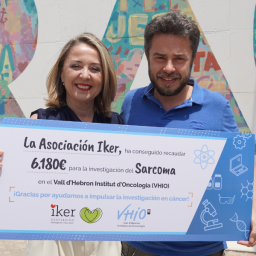
Recently published in the journal Nature Medicine (1), results of exploratory research from the open-label phase III INTRIGUE clinical trial demonstrate the potential utility of circulating tumor DNA (ctDNA) next-generation sequencing (NGS)-based analysis in informing personalized treatment decision making in patients with advanced gastrointestinal stromal tumor (GIST).
Led by first author Michael C. Heinrich, Professor of Medicine at the Oregon Health & Science University Knight Cancer Institute, Portland, USA, this present multicenter retrospective study—co-authored by VHIO’s César Serrano—was designed to evaluate the use of liquid biopsy through ctDNA sequencing to aid the selection of personalized therapies targeted to KIT-mutant GIST.
The phase III INTRIGUE study evaluated the efficacy and safety of second-line ripretinib versus standard therapy with sunitinib in patients with advanced GIST after treatment failure to imatinib. In the primary analysis, ripretinib did not meet the study’s endpoint of superiority compared with sunitinib. Similar clinical activity was however observed and ripretinib was better tolerated in this patient population.
“In clinical and preclinical studies, ripretinib and sunitinib have shown differential activity based on the exon location of KIT mutations. We hypothesized that performing mutational analysis using circulating tumor DNA could provide further insights and help us to better understand the negative results of the INTRIGUE study,” says César Serrano, head of VHIO’s Sarcoma Translational Research Group and a Medical Oncologist at the Vall d’Hebron University Hospital (HUVH).
The investigators analyzed the molecular profile of patients using samples obtained by liquid biopsy from the INTRIGUE study. They assessed the clinical activity of these two single-agent therapies according to the identified mechanism of acquired tumor drug resistance. Findings from their exploratory analysis show that sunitinib demonstrated improved results in patients with KIT exon 13/14 mutations, an area of the KIT kinase known as the ATP binding domain, while ripretinib showed greater benefit in patients harboring exon 17/18 KIT mutations in the activation domain.
A remarkable improvement in progression-free survival was observed in patients with KIT exon 17/18 mutations who received treatment with ripretinib versus those who were administered sunitinib, 14.2 months versus 1.5 months, respectively.
“Our findings support the potential use of liquid biopsy to differentiate between these two molecular subpopulations of GIST and help guide treatment decision making accordingly,” adds César Serrano, co-author of this present study.
Results of this study led to the initiation of the ongoing international multicenter phase III INSIGHT clinical trial, for which César Serrano serves as a member of the Steering Committee. Guided by liquid biopsy, GIST patients with specific KIT resistance mutations, who were previously treated with imatinib, will be randomly assigned to receive treatment with ripretinib or sunitinib. This is the first time that investigators are using liquid biopsy to guide treatment decision making in this patient population.
Present findings support previously reported results in Annals of Oncology (2) (Serrano et al. 2023). Led by César Serrano, the blood-based circulating tumor DNA analysis of plasma samples from patients enrolled in the phase III VOYAGER clinical trial showed that ctDNA sequencing can predict cancer drug response and resistance in metastatic GIST based on the detection KIT/PDGFRA mutations.
“Both of these studies support the utility of liquid biopsy in the personalized management of patients with GIST. Once our results are validated by findings from the INSIGHT study, we will have a powerful new tool to better predict individual patient responses to different therapies and guide the selection of molecularly matched, targeted treatments,” concludes Serrano.
###
References:






















